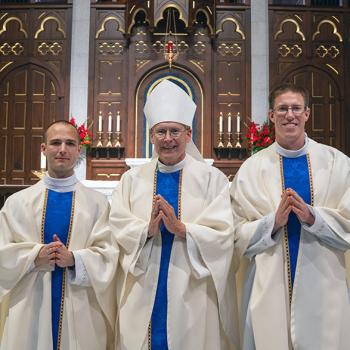Origen of Alexandria came up with the idea first.
Unless you're a Christian history geek, chances are you've never heard of Origen. He lived in Egypt from about 185 to 253—meaning he was a third-century Christian, who died sixty years before Constantine decriminalized the faith. In other words, he lived long before the desert fathers and mothers, before the rise of Christian monasticism, before what we now know as "Christian mysticism" or "contemplative spirituality" really took shape. Indeed, Origen's extensive writings inspired the great desert father Evagrius, who is generally considered to be the first Christian writer to describe contemplative prayer in his work.
The "idea" that I'm referring to is the notion that Christian spirituality can be understood as involving three stages. To give this notion a bit of gravitas, Origen appealed to the Hebrew Scriptures. He saw three of the wisdom books: Proverbs, Ecclesiastes, and Song of Songs, which appear in consecutive order in the Christian Old Testament; as symbolic of these three stages, which he labeled (in Greek) ethike, physike, and enoptike. Translated into English, the stages involve the acquisition of virtue or ethics, which leads to a more Godly way of relating to the natural world, which in turn prepares one for the vision of God, or contemplation.
It's not hard to connect the dots with the wisdom literature Origen appealed to: for Proverbs is moralistic and concerned with proper behavior; while Ecclesiastes, deeply existential and almost cynical in tone, seems to suggest a detached, "spiritual" way of relating to the world; leading finally to the Song of Songs, the sensual collection of love poems interpreted by Origen as a grand metaphor for the love of God for humanity.
Origen's ideas were shaped and adapted by future spiritual writers, finally reaching a classic formulation in the writings of Pseudo-Dionysius the Areopagite, an anonymous Syrian monk who lived around the year 500. In his essay on angels called The Celestial Hierarchy, Pseudo-Dionysius describes the "beatitude of God" as "purifying, illuminating, and perfecting; or rather it is itself purification, illumination, and perfection." This "threefold way" appears again and again in subsequent spiritual teachings, both in the eastern and western churches; writers as diverse as St. Bonaventure, St. Thomas Aquinas, John Ruysbroeck, and Reginald Garrigou-Lagrange have used some form of this three-step model in their explication of the spiritual life.
Others, like Evelyn Underhill, expand upon it (Underhill proposed a five-stage model of awakening, purification, illumination, dark night of the soul, and the unitive life). Even in our time, Robert Davis Hughes' splendid study of the spiritual life, Beloved Dust, uses the threefold way, although with the metaphor of waves crashing on the shore to suggest a cyclical, rather than linear, way of approaching the stages.
There's nothing sacrosanct about the threefold way; it is not found in the Bible (unless you accept Origen's rather fanciful interpretation of entire books as carrying symbolic meaning). I think it has had such currency in the tradition for so long simply because it is a useful way of mapping the life. After all, purification (in Greek, katharsis) suggests a kind of spiritual detoxification, a process of letting go of anything that stands in the way of growth in grace--a logical starting point for any serious exploration of contemplation. This leads to illumination (theoria), or contemplation proper, where the cleansed soul is now open to beholding the beauty of the divine mystery; a process which in turn releases into perfection or union (theosis), a profound, graced state of nonduality where God and the created soul are "not-two."
As Meister Eckhart so eloquently described it, "The eye with which I see God is exactly the same eye with which God sees me. My eye and God's eye are one eye, one seeing, one knowledge and one love" (Sermon 16).
This is mind-boggling stuff, and words like "purification" or "illumination" or "unitive" can strike ordinary Christians, who simply want to get closer to God, as unnecessarily abstract (or abstruse). So I was truly impressed this past weekend, when I was leading a retreat at the Monastery of the Holy Spirit, and was discussing the threefold way with the retreatants. One woman raised her hand, and said "It seems to me that the first stage is about learning the rules, while in the second stage you move from the rules to wisdom, and in the final stage you move into love."
I didn't miss a beat. "Do you mind if I write about that?"
"Of course," she said humbly. "After all, it didn't come from me."
I suppose some scholars or other folks who make it their business to be "theology police" would gladly argue over the defects in trying to simplify purgation, illumination, and union in terms of law, wisdom, and love. But that would be to grossly miss the point. After all, no word we use can ever capture the mysterious dynamics of grace in our lives. But what makes law, wisdom, and love such a wonderfully succinct explanation of the threefold way is its sheer simplicity.
An important part of the spiritual life is learning how appropriate boundaries are necessary for any kind of relationship (including our relationship with God, and with our own selves). And just as important is discovering that place where a deep discerning wisdom takes us beyond a rigid, legalistic, "by-the-book" approach to God. And such wisdom, in turn, provides the foundation for what is really the main point behind spirituality: to receive love, to grow in love, to become love. I for one cannot think of a better way to describe theosis. May we all receive the grace to follow this path.
12/2/2022 9:10:31 PM




